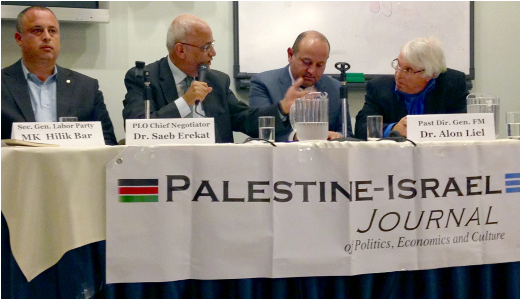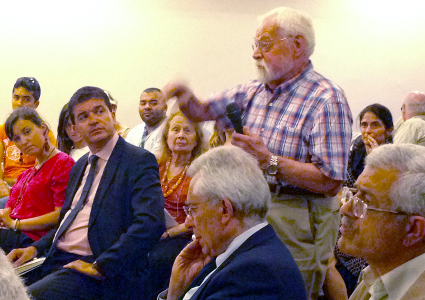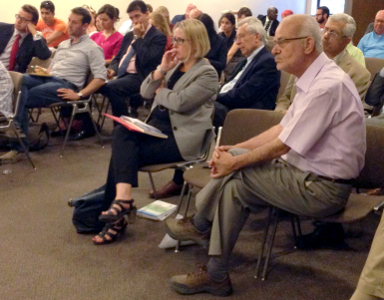"Diplomatic recognition of a Palestinian state is the only language Israel understands", said Dr. Alon Liel, calling for more member states of the European Union to recognize Palestine.
Dr. Liel was speaking at a launching conference on June 8th, held at the Notre Dame Center on the border between East and West Jerusalem, to mark the publication of the latest issue of the Palestine-Israel Journal devoted to Time for International Legitimacy. After introductory remarks by PIJ co-editors Ziad AbuZayyad and Hillel Schenker, and opening remarks by Swedish Consul General Ann-Sofie Nilsson, the overflow audience listened to stimulating and thought-provoking presentations by the four keynote speakers, Dr. Alon Liel, former director General of the Israeli Foreign Ministry and Ambassador to South Africa, MK Hilik Bar, Secretary General, Deputy Knesset Speaker and Secretary General of the Labor Party, Ambassador John Gatt-Rutter, EU Representative to the West Bank and Gaza Strip, and Dr. Saeb Erekat, the Chief Palestinian Negotiator, Member of the PLO Executive and Fateh Central Committee. The general contents of the panel discussion, and the exchange with the audience which consisted of Israelis, Palestinians, international diplomats and members of the media, served as both a warning and a wake-up call about the urgency of making progress towards a resolution of the Israeli-Palestinian conflict.
Dr. Liel noted that in the fall of 2014, ten parliaments of the European Union, including France, Britain, Spain, Ireland, and Portugal passed motions urging government recognition of Palestine. Since then, following the terrorist attack in France and a pause for the outcome of the Israeli elections, progress has waned, with only Italy, Belgium, and the Vatican following suit. He expressed frustration with the decline of the momentum from the EU since 2014. “48 years of occupation is enough!" Liel also emphasized the importance of the decision by FIFA to establish a committee to investigate the possibility of racism in Israeli football (soccer) and the status of the five Israeli teams that are based in West Bank settlements.

(l to r) MK Hilik Bar, Dr. Saeb Erekat, Ambassador John Gatt-Rutter and Dr. Alon Liel. (Photo-Patricia Cordell)
"We must address the Israeli public's legitimate concerns": MK Hilik Bar
Liel’s comments were tempered by MK Bar, who warned against isolating Israel by promoting an international-campaign that excludes Israel. Bar argued that the outcome of this strategy can be seen in the results of the 2015 election. He said that the Israeli right’s “conflict management” strategy is re-energized by steps taken to end the conflict that don’t address the Israeli public’s legitimate concerns.
Although his center-left Labor Party running under the banner of the Zionist Union lost to the right-wing Likud, Bar asserted that majority support for two-states exists within the Israeli electorate. He further criticized the “no partner assumption” on the right, calling it an excuse not to make peace.
“[Mahmoud] Abbas is not a perfect partner, but Netanyahu is not a great partner either.” Bar was optimistic, saying that a detailed framework for a deal exists, but the rightwing government’s insistence on a perfect partner is irrational. “They want a Palestinian president who is a great Zionist, with a picture of Herzl in his office.”
"Labor should stand tall and recognize a Palestine state": Dr. Saeb Erekat
Dr. Saeb Erekat, proposed to Bar and Labor outright, “to stand tall and extend full recognition to the state of Palestine.” The recent international efforts coupled with a move by the Israeli left toward a solution, could be a powerful combination. The latest election focused disproportionately on domestic and economic issues, and the two- state solution was largely absent from campaign discourse.
Rather than waiting for cooperation within Israel, especially the current coalition under the leadership of Benjamin Netanyahu who as Erekat pointed out, “wants the Palestinian Authority without the authority,” among other statements spurning the advancement of peace negotiations, Erekat declared the Palestinians' resolve to move forward with a campaign for progress based upon the use of international law and bodies.
“We have a right to access 523 conventions, organizations, and agencies,” 42 of which Palestinian President Mahmoud Abbas signed in 2014, including the Rome Statute of the International Criminal Court. The ICC has begun preliminary discussions about Palestine’s claim that Israel has committed war crimes, especially continuing settlement activity, illegal under the 4th Geneva Convention.
Erekat issued a simple warning for the Israeli government, saying “If you don’t like courts, stop committing crimes.”

The audience engaged with the speakers with pointed questions and comments. (Photo, Patricia Cordell)
Is the new Israeli government a partner to a two-state solution?
There is a feeling that a tidal shift is occurring especially in Europe, with recognition of the existence of human rights violations in an increasingly turbulent Middle East. Among the latest developments are proposals for draft UNSC resolutions from France and New Zealand, which puts pressure on Palestine and Israel to resume diplomatic talks within 18 months. Despite from the fact that Prime Minister Benjamin Netanyahu has backtracked on his rejection of the possibility of a Palestinian state on the eve of the Israeli elections, his recently appointed cabinet and specifically Minister Silvan Shalom, designated as the new chief negotiator with the Palestinians, is a sign of the current coalition’s lack of enthusiasm for the peace process. Shalom is a strong opponent of the two-state solution and adamant supporter of settlement expansion in the West Bank, illegal under international law.
But with enough international pressure, Erekat said that Israel might be coaxed into a return to peace negotiations in order to mitigate damage from convictions by international bodies, not least of which from the ICC. Although Netanyahu will claim Israel’s security is threatened by a peace agreement, by removal of settlements as buffers, Israel’s security concerns are to a great degree addressed by tending to Palestine’s concerns. In a continuing state of occupation, just as Israel’s government has moved right and toward extremism, so is Palestine’s body politic giving way to more extremist forces.
Without diplomatic progress, the moderates are losing support among the Palestinians
A recent Hamas election victory at Birzeit University north of Ramallah, which had been a Fateh stronghold, does not come as a surprise to Erekat. Frustrated with years and years of occupation and little diplomatic progress, young Palestinians are saying “don’t listen to moderates like Saeb Erekat.”. He expressed the difficulty in keeping support for the peace process. “Our message to Palestinians is avoid violence, stay the course with us...but we are losing support among Palestinians, and we stand to lose more than Birzeit."
It is clear the Palestinian leadership has refused to accept the status quo, and despite inevitable setbacks, has made enormous progress in advancing a political solution. The push toward an international framework has proven effective in restarting a global discussion.
"The common responsibility of the international community": Swedish Consul General Nilsson
Swedish Consul General Ann Sofie Nilsson, in her opening remarks, highlighted the urgency of reaching a resolution of the conflict. “The present situation is a depressing status quo,” said Nilsson, who noted with pride Sweden’s recognition of Palestine in October 2014. However, she added that the full efficacy of Sweden’s decision would be lost if the European Union does not follow suit. Nilsson spoke about the “common responsibility” of the international community to advance the negotiations.

(R to L – Front row) PIJ Co-Editor Ziad AbuZayyad and Swedish Consul General Ann-Sofie Nilsson. (Photo – Patricia Cordell)
"The Europeans are determined to play a political role at the table": EU Ambassador John Gatt-Rutter
EU ambassador to the West Bank and Gaza, John Gatt-Rutter, , echoed Nilsson in pointing out that “the EU has a role in affecting the overall environment,” the decision to contribute assets and political will, provide proof of the member state’s “belief in the peace process.” Despite the apparent bleak chance of success, the European Union will become more involved in brokering a peace deal between Israel and the Palestinians, the European diplomat said. “We are absolutely determined, more than ever, to play a political role at the table,” he said. ”What we would ultimately bring to the table is the strength of our relationships with both sides…If we and the Americans could coordinate our actions and our positions, that could be quite a serious contribution,” he said.
There is much irony in Israel’s dismissal of international conventions like those against settlement in occupied territory, as much of international law as it exists today was developed to prevent atrocities such as those committed onto European Jews in World War II, and the delayed response of the international community.
"Musicians, doctors and scientists – not suicide bombers"
The effectiveness of international pressure remains to be seen, but Palestine has statehood in its sights. Dr. Erekat closed by saying “I was twelve years old, 48 years ago,” when Israel annexed East Jerusalem and the West Bank in 1967. Lamenting over another 48 years and the shared aspirations of Palestinians and people all over the world, Erekat ardently stated “I want my grandchildren to be musicians, doctors, and scientists — not suicide bombers.”
